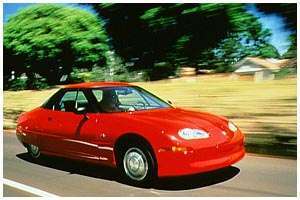Who Killed the Electric Car?
 I just watched a movie that came out a few months ago, and is now available for download. It's an environmentalist movie about how GM killed the EV-1. I watched it because I'm a sucker for a giant download off of YouTube.
I just watched a movie that came out a few months ago, and is now available for download. It's an environmentalist movie about how GM killed the EV-1. I watched it because I'm a sucker for a giant download off of YouTube.The EV-1, for those who don't know, was GM's first attempt at an electric car. It was a 2-seat car that ran on lead-acid batteries, had a top speed of 70mph, a range (best case) of about 80 miles, took 12 hours to charge up, looked like a suppository with headlights, and cost something like $250K. GM leased the cars to celebrities, several of whom were interviewed throughout the movie. (Mel Gibson even appears in it, wearing a freakishly large and striped beard. Maybe he was trying to disguise himself.)
Anyway, sometime around 1999, GM cancelled the leases on the cars, and took them back. Some of the people who had EV-1s wanted to keep them, but GM said "no". They wouldn't sell the cars to customers either. They just came and took them, then hauled them all to the crusher.
So. This movie is a long tirade about how bad it was that GM did away with this great car. It paints all kinds of fanciful pictures about the oil industry, the auto industry, the Bush administration, the House of Saud, the California Air Resources Board, and other members of the Legion of Doom. According to the movie, these evil forces all acted together to kill the electric car. Their apparent motivation in doing so was to kill bunnies, cloud the sky with smoke, burn oil, and enslave the American people. Killing the EV-1 was but one step in their master plan for humanity's downfall.
It also put some of the blame for the murder of the EV-1 on the American consumer. The average American consumer, according to the movie, is pretty dumb, and could have been convinced to buy EV-1s by the zillions if sufficient marketing muscle had been applied. One voice-over in the movie even said "Look. The American people will buy what you convince them to buy. You feed them something enough, they're going to start to believe that's the diet, know what I'm sayin'?"
Puh-leeeeze. Here's what the EV-1 was. It was a 7000-pound golf cart with no air conditioning, pathetic range, lame performance, an exceptionally high price and no luggage space, in a world whose population isn't inclined to wait around for 12 hours for it to charge its batteries. The only people who had EV-1s were celebrities who only took them out once in a while to show off how "green" they are, and who normally spend their time in gas-guzzling limousines or private jets. GM killed the EV-1 because it deserved to die.
Any "dumb American consumer" can use their rudimentary math skills to figure that their money is far better spent on a sensible gas-powered car. For about 1/15th the EV-1's purchase price, you can buy a car that can outrun, out-distance, out-haul and out-last an EV-1, and it will get somewhere in the neighborhood of 30 mpg. You can also fit it with loud exhaust and throw one of those colorful fireplace logs in the exhaust stream, and get the side benefit of annoying the kind of ninnies that appear in movies like this.
I think electric cars are a cool idea, and someday, they might actually be practical. And by "practical", I mean "have enough of the ability that a conventional car has that a normal person might actually want to use one". The EV-1 didn't have it, and neither do other electric cars. The EV-1 was a nice experiment, it's over, and everyone (except the misty-eyed redhead in this idiotic whinefest flick) has moved on. Until you can drive an electric car a respectable distance on a charge, and recharge it in about the same time it takes to pump fuel into a conventional car, it's not going to replace the conventional car. Ironically, the only people dumb enough to think otherwise are the people in this movie who are convinced that the rest of us are stupid.
If I were GM, I might have chosen to let the whiners in this movie keep their EV-1s, in exchange for having their mouths surgically removed. That would go a long way toward reducing some real pollution.

0 Comments:
Post a Comment
Subscribe to Post Comments [Atom]
<< Home